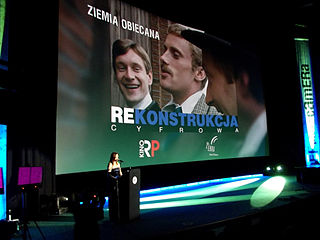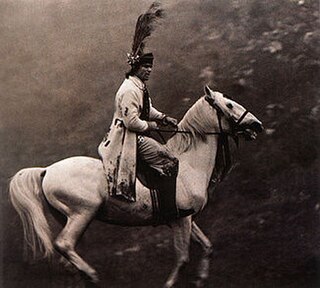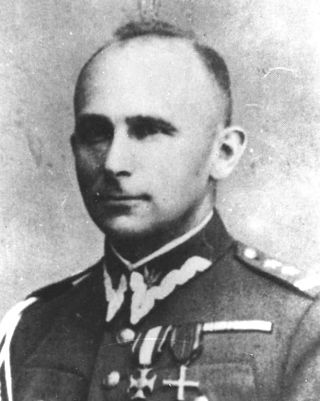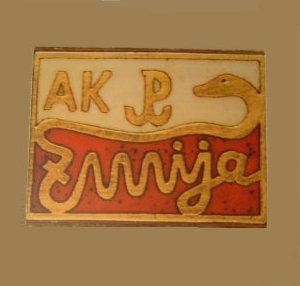
The history of cinema in Poland is almost as long as the history of cinematography, and it has universally recognized achievements, even though Polish films tend to be less commercially available than films from several other European nations.

Ashes and Diamonds is a 1958 Polish drama film directed by Andrzej Wajda, based on the 1948 novel by Polish writer Jerzy Andrzejewski. Starring Zbigniew Cybulski and Ewa Krzyżewska, it completed Wajda's war films trilogy, following A Generation (1954) and Kanal (1956). The action of Ashes and Diamonds takes place in 1945, shortly after World War II. The main protagonist of the film, former Home Army soldier Maciek Chełmicki, is acting in the anti-Communist underground. Maciek receives an order to kill Szczuka, the local secretary of the Polish Workers' Party. Over time, Chełmicki increasingly doubts if his task is worth doing.

The Poland men's national basketball team represents Poland in international basketball competitions. They are controlled by the Polish Basketball Federation (PZKosz).

Colonel Wolodyjowski is a 1969 Polish historical drama film directed by Jerzy Hoffman. The film is based on the 1887 novel of the same name by Polish writer and Nobel laureate Henryk Sienkiewicz. The story is set during the Ottoman Empire's invasion of Poland in 1668–1672.
More Than Life at Stake, also known as Stakes Larger Than Life and Playing for High Stakes is a Polish black and white TV series about the adventures of a Polish secret agent in Soviet service, captain Hans Kloss, who acts as a double agent in the Abwehr during Second World War in occupied Poland.

Wesele (The Wedding) is a motion picture made in 1972 in Poland by Andrzej Wajda as an adaptation of a play by the same title written by Stanisław Wyspiański in 1901. Wajda also directed "Wesele" for the theatre.

How I Unleashed World War II is a Polish feature film made in 1969, based on Kazimierz Sławiński's novel "Przygody kanoniera Dolasa". It was shot in Sochi, Baku, Poświętne and Łódź, among other places.

Katyń is a 2007 Polish historical drama film about the 1940 Katyn massacre, directed by Academy Honorary Award winner Andrzej Wajda. It is based on the book Post Mortem: The Story of Katyn by Andrzej Mularczyk. It was nominated for Best Foreign Language Film for the 80th Academy Awards.

The Bureau of Information and Propaganda of the Headquarters of Związek Walki Zbrojnej, later of Armia Krajowa, a conspiracy department created in spring 1940 during the German occupation of Poland, inside the Związek Walki Zbrojnej, then of the Supreme Command of Armia Krajowa.

The Żmija Group - a group of conspiracy military units of the Sub-district II of Żoliborz of Armia Krajowa in Żoliborz in Warsaw during the German occupation of Poland. The units took part in the fights of the Warsaw Uprising of 1944.

Landscape After the Battle is a 1970 Polish drama film directed by Andrzej Wajda and starring Daniel Olbrychski; telling a story of a Nazi German concentration camp survivor soon after liberation, residing in a DP camp somewhere in Germany. It is based on the writings of Holocaust survivor and Polish author Tadeusz Borowski. In most part, the plot revolves around the events depicted in Borowski's short story called "Bitwa pod Grunwaldem" from his collection This Way for the Gas, Ladies and Gentlemen. The film was entered into the 1970 Cannes Film Festival.

Adam Stanisław Grabowski, of the Zbiświcz coat-of-arms, was Bishop of Chełmno 1736–39, Bishop of Kujawy 1739–41, Prince-Bishop of Warmia 1741–66.

Bad Luck is a 1960 Polish black comedy film directed by Andrzej Munk. The screenplay is based on Jerzy Stawiński’s novel Six Incarnations of Jan Piszczyk (1959).
Warsaw Premiere is a 1951 Polish historical film directed by Jan Rybkowski and starring Jan Koecher, Barbara Kostrzewska and Jerzy Duszyński. The film's art direction was by Roman Mann. The film portrays the life of the Polish composer Stanisław Moniuszko, particularly focusing on the composition of his 1848 opera Halka. The film was the first Polish costume film made since the Second World War, and was stylistically similar to historical biopics in other Eastern Bloc countries such as Rimsky-Korsakov (1952).

8th Uhlan Regiment of Prince Józef Poniatowski was a cavalry unit of the Polish Army in the Second Polish Republic. Until 1939, it was garrisoned in Krakow, and its traditions dated back to 1784, when a cavalry regiment of Prince Józef Poniatowski was formed in Lwow. The Prince Poniatowski Regiment was part of the Imperial Austrian Army, and in the early 20th century was called 1st Regiment of Austrian Uhlans. Nevertheless, it was made of ethnic Poles, with Polish officers and Polish traditions. In late 1918 it was renamed into 1st Land of Krakow Uhlan Regiment, and after a few years it was renamed again, into 8th Uhlan Regiment of Prince Jozef Poniatowski.













